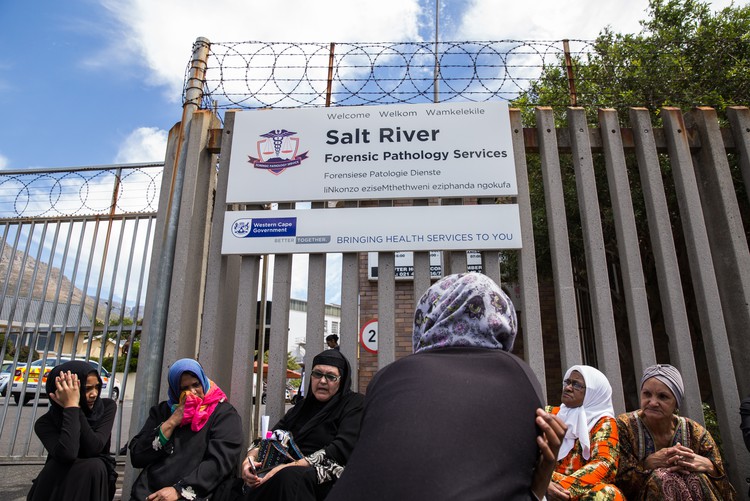
Undertakers and family members protested last week outside the Salt River Forensic Pathology Service about delays in post-mortems on Muslim bodies. Photo: Ashraf Hendricks
18 October 2017
Cases of gunshot deaths examined at Cape Town’s forensic pathology services have increased by more than 56% over the last year, according to Marika Champion, director of communications for the Western Cape Department of Health.
“During a year-on year comparison between 2016 and 2017 there is a total overall increase of 56.5% of gunshot fatalities (from 306 to 479 cases during a three-month period),” Champion told GroundUp.
She said the post-mortem case load for gunshot deaths examined at the Salt River and Tygerberg Forensic Pathology Services had increased by 12% a month on average in the last three months, from 140 cases in July to 163 cases in August and 176 cases in September.
Champion was commenting on complaints that a backlog of autopsies was delaying Muslim burials.
On Friday last week a group of Muslim undertakers, family members of deceased and others protested outside the Salt River Forensic Pathology Service against a decision by the Western Cape Department of Health to perform autopsies and release bodies in chronological order, instead of prioritising autopsies on Muslims.
After a meeting with the Muslim Judicial Council (MJC) the Department said it was “committed to the established practice of prioritising the autopsies of Muslim bodies, in recognition of Islamic law” but the practice of prioritisation had come under pressure “due to the extremely high caseload of unnatural deaths” in the Western Cape. Though more staff had been appointed, the Department “has not been able to maintain the expected 24-hour release period for Muslim bodies. The current average period for the release of bodies is six to seven days,” the Department said.
The MJC had made it clear that this period was unacceptable and asked for it to be shortened. “The Department committed to an internal review of its procedures in an attempt to shorten the current average period for the release of bodies, with weekly communication updates to the MJC,” the Department said.
It had also promised to stay in touch with families.
Igsaan Isaacs, a member of the newly formed Western Cape Muslim Undertakers’ Forum, said he had been an undertaker in Mitchell’s Plain for 20 years.
He said that in the Muslim religion, the body of the deceased must be buried before sunset on the day of the death. If this was not possible, he said, “the burial needs to be done as soon as possible”. He said the Department of Health had a longstanding agreement with the Muslim community that autopsies on Muslims would be prioritised.
“The mortuary performs 15 autopsies a week. They released the most recent list of autopsies and no Muslim bodies were on that list,” said Isaacs.
Riad Fataar, the chairperson of the MJC Cemetery Management Committee, said the Department had raised the staffing issue at the meeting and asked the MJC to be patient. He said the MJC had agreed that the the bodies should be released in chronological order “for now” until the backlog was sorted out.
Fatima Levy, a 59-year-old resident of Athlone, said her sister’s son-in-law had died in a shooting at around 8pm on Monday 9 October. She said the family had waited for his body for a week.
“We can accept that he has passed away, but we don’t have to accept this,” said Levy.
Champion told GroundUp that the forensic caseload had increased by 76% in the Western Cape since 2012.
She said the department was funding six new Forensic Pathology Officer posts and one new Medical Officer post in an attempt to alleviate the backlog and prioritise Muslim bodies again.